An Inspiring Weekend of Camaraderie
AR Staff, American Renaissance, November 21, 2022
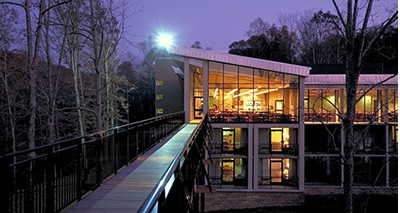
Once again, the American Renaissance conference was a smoothly organized weekend of fellowship, keen insights, and inspiration. We met at our usual venue — the lodge at Montgomery Bell State Park in Tennessee — where law enforcement professionals kept demonstrators so far away that most attendees were never even aware of the protest — though see below for a bit of excitement in which our group played no part.
We began with a cocktail reception on Friday night, where Jared Taylor talked about his very successful speaking engagement at Arizona State University organized by a promising new group, College Republicans United. Mr. Taylor called the engagement “a textbook case” of how to bring a controversial speaker to a college campus. Mr. Taylor joked that the 100 or so lefty demonstrators — firmly kept behind barricades by campus police — should have sent him a thank-you letter. With a genuine SPLC-certified “white supremacist” on campus, they surely had more fun bawling and prancing than they’ve had in years.
On a much more serious note, Mr. Taylor was joined by Sam Dickson and Gregory Hood in a remembrance in honor of our staffer, Chris Roberts, who died suddenly in June. Mr. Taylor noted that the very day before he died, Roberts — his real name was Martin Rojas — had been in a staff meeting, planning, joking, full of ideas as usual. Mr. Taylor added that it took him several weeks fully to absorb the harsh reality: that Roberts was not on vacation or out of town, that he really was dead and would never come back.
Mr. Hood spoke with admiration of Roberts’s self-taught erudition, especially in matters of leftist politics and philosophy. He noted wistfully how fully committed Roberts had been to our cause, and how tragic it was that a man of his great talents should have been cut down before the age of 30.
Mr. Dickson talked about Roberts’s very hard upbringing, of the incredible odds he had overcome to win a place among the handful of those fighting full-time for our people. He noted that Roberts had taken leave from AmRen to explore his Chilean roots — his father was from Chile — but had come back to America, where he had found his true calling as an activist for our people. His loss was a great shock.
Saturday was a full day of speeches, beginning with Christopher Zeeman, better known as The Z-Man. He has a professional career working with systems, so he turned his analysis skills on the system under which Americans live. “You’re not going to get what you want from the systems you have,” he said. That means changing the systems, and changing systems, he added, “is revolution.” He agreed that this is a frightening word, one that evokes images of “bad guys changing our stuff,” but revolution is necessary.
Why? “Because there’s nothing left to defend . . . The system is broken and cannot be fixed.” Great revolutionary thinkers, he added, show people a world “free” from a seemingly intractable problem. Marx promised a world free from economic coercion. Mr. Zeeman’s vision of our future is one in which we have a world free of racial coercion: “We want to be answerable only to ourselves.”
Mr. Zeeman said we are the “vanguard of a movement,” and that we are successful when “people want to be like us.” He said the purpose of organizing is “changing minds,” and advised organizers to “stop trying to be tough guys online” and avoid futile online feuds. Instead, he said our people should become the best possible versions of themselves and act with dignity and distinction. We should remember there’s “some salvation in every soul,” and we must never give up hope.
Jared Taylor introduced Laura Loomer, expressing disappointment that despite the terrific fight she had put up on the campaign trail, he could not address her as “Congresswoman-elect.” Miss Loomer expressed her pleasure at being invited to speak to a conference of people “leading the charge educating people about our replacement.” She also reminded the audience of the issues on which she has been fighting, both personally and as a candidate. “I was banned [from every mainstream platform] because I am an unapologetic America First nationalist,” she said. “I was taken out because I was effective. I am Jewish, but I consider myself a white advocate and I campaigned as a white advocate.”
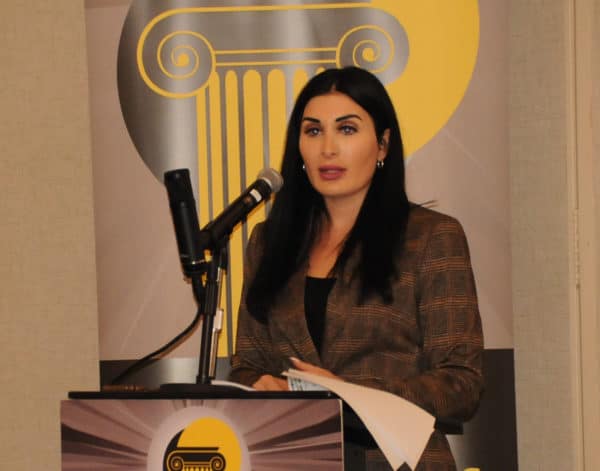
She argued that failing to protect free speech was President Trump’s biggest failure, adding that her own “digital extermination” inspired her to run for Congress. She cited her experience with the leadership of both parties and their opposition to free speech, arguing that our political system is now a “Uniparty.” “Five billionaires in Silicon Valley are curating our discourse,” she said, “and they have more power than the President.”
Miss Loomer noted that many of the censors who work for Big Tech are “Third World invaders,” which means that strangers help decide what we can say, read, and think. She added that we are close to living under a “tyrannical regime” in a “failed state,” with the farce of America’s elections as proof. She argued that free speech has been the engine of progress in the West and called for us to defend a country that was “once a shining example of what is possible when white men come together to build something great.”
As a candidate, she ran on a three-point program of election integrity, fighting social-media election interference, and a ten-year immigration moratorium. She also called for recognizing political affiliation as a protected civil rights category and for making Election Day a federal holiday. A national holiday would mean a huge majority could vote in person, removing the potential for fraud in mail-in ballots and early voting.
Miss Loomer said that the alliance of Big Tech, Big Pharma, and Big Banks pose a threat to everyone’s liberty, to the point that she is now a “civil rights activist.” Against this monstrous “technocracy,” she believes it is more important than ever that she serve in Washington as the voice of those who are now utterly without representation.
Henrik Palmgren of Red Ice presented a comprehensive economic and geopolitical case for why he believes the current global order will collapse. One factor will be efforts by the United States to separate its supply chain from China. This will be complicated by China’s near monopoly on rare earth minerals, which are necessary for building electric vehicles and other parts of the new, supposedly “green” economy.
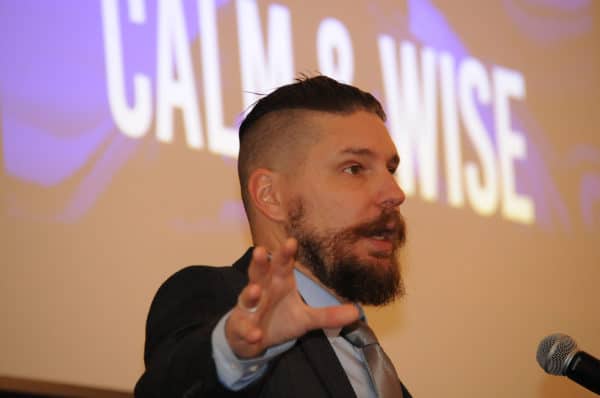
The catastrophic combination of China’s zero-Covid policies, the demographic crunch caused by the misguided “One-Child” policy, and the general failures of its command economy mean Beijing does not have much room for maneuver. China’s population will contract over the coming decades, and it will no longer be the world’s manufacturing center.
The world economy will also suffer from the attempt to freeze out Russia; this has already resulted in major energy shortages for Germany. Russia also controls other important resources, so attempts to force it out of the trading system could jeopardize globalism.
Mr. Palmgren argued that the system will intensify its attempts to centralize control. He noted that even as we were meeting, the Federal Reserve was in a 12-week experiment with some of America’s biggest financial companies to test a Central Bank Digital Currency. This could let the government directly control what people are allowed to buy. He also said that JP Morgan Chase has already been sending representatives to DHS meetings on how to fight “disinformation,” meaning that the precedent for debanking is already being set.
Finally, Mr. Palmgren described the so-called ESG (Environmental, Social, Governance) scores that companies such as asset manager BlackRock are now pushing on corporate America. He described this as a corporate version of China’s Social Credit System, and noted that companies are rewarded with a higher score by discriminating against whites to increase “diversity.”
He concluded that each of us will have to decide for himself how to survive a potential collapse, but in chaos will come many possibilities for renewal.
Daniel Vinyard told fascinating stories of his 30 years of service as a police officer. He has done and seen everything: gang squad, undercover narcotics, and SWAT. Mr. Vinyard warned of the terrible effects of the vilification of the police. If an officer can lose his career for doing his job as he believes it must be done, he will not follow up hunches or take risks. This leads to increasing brazenness of criminals, followed by yet more reluctance of politicians to support serious law enforcement. This leaves the public — especially vulnerable minorities — far more likely to become victims.
Mr. Vinyard expressed his dismay at the now-common practice of passersbys hindering the effort of officers and making videos of them rather than helping stop crime or identify criminals. He noted that this creates such a miserable work environment that virtually no one is applying for places at America’s police academies. Mr. Vinyard worries that departments will be forced to hire sub-standard recruits, who will become bad officers, thus justifying further restrictions on their numbers and their ability to fight crime. This vicious cycle could leave all Americans at the mercy of criminals.
Gregory Hood argued that what our movement needs more than anything is a Sorrelian Myth to inspire immediate action for a long-term goal. He said that the question about whether a “white identity” is legitimate is meaningless, because all whites in the West already have a negative white identity forced on them. The question is whether whites will accept this imposed villain status, or whether we will be the heroes in our own story. He added that because everything from scientific accomplishment to being on time has now been smeared as “white,” our opponents have unintentionally defined us as the unique source our civilization — Western Civilization — of everything beautiful, noble, and great.
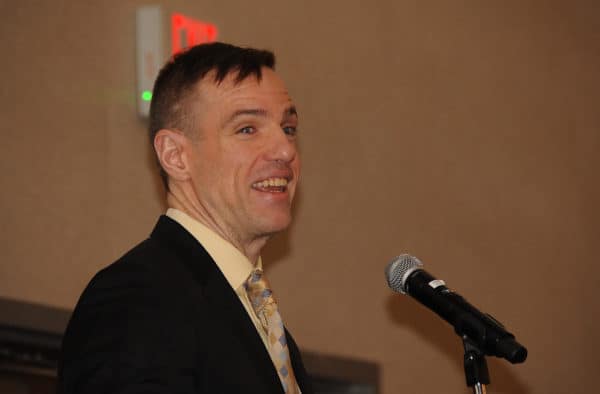
Mr. Hood argued that the West is entirely on the wrong course because it is following an egalitarian morality that will end with dissolution and chaos. Young whites trapped by this system give in to depression and suicide. He said that the system benefits from breaking people, because the weak and dependent need the system to survive. He said whites will be treated as whites whether they like it or not. Whites should therefore make this a source of pride rather than shame, and accept the historical challenge to build a new kind of state.
Mr. Hood said that white identity is more vivid than civic identity in North America and Western Europe. Our mission, he said, is to build a Western Civilization-State that would have the explicit purpose of ensuring the physical survival of the white race, the advancement of Western culture, and the upward development of every Western man and woman to his or her fullest potential. Rather than a state that destroys all that is good, Mr. Hood argued for a radical break and a new political and cultural order that he said would be the culmination of Western society and the completion of our historic mission.
Ruuben Kaalep, a member of the Conservative Party in Estonia and an elected parliamentarian, took a different view, in a presentation he made by video. He passionately defended ethnonationalism and independent nation-states. He said ethnostates are the norm in Eastern Europe. “We are an ethnostate,” he said of Estonia, “and we exist, and we are successful.” He said that the explicit purpose of his nation-state is to ensure the survival of the Estonian people and their culture. Mr. Kaalep said the Ukrainian struggle against Russia is part of the nationalist struggle, and called for American whites to support Kyiv. Ukraine, he said, is fighting to take its place among other ethnostates. He argued that in the current era, white nationalism must never be imperialist, but should respect the autonomy of all peoples.
Nevertheless, although he insisted that different peoples should have their own states, Mr. Kaalep argued that white nationalists around the world should work together. He said Eastern Europeans must be especially cautious because they are threatened both from the east (Russia) and the west (Brussels and Washington, DC). “Our future is united,” he said, calling for “an alliance between nationalists around the world.”
Former Congressman Steve King was the after-dinner speaker. He guided the audience through Western history, identifying the origin of key concepts such as the rule of law, the right to confront one’s accusers, and limits to the power of the state. He defended whites as the group indispensable to the creation of Western Civilization. He said the rule of law began with Moses, the concept of free speech with Socrates, and the general spread of civilization with Rome. However, the seminal event in the history of Western Civilization was the birth of Christ. Congressman King also said that the West rests upon the pillars of American Exceptionalism, and argued that the United States is now the “lifeboat of Western Civilization.”
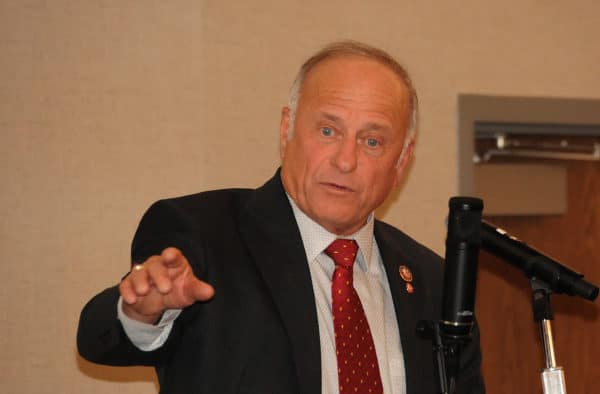
Congressman King evoked crucial Western victories, from the Siege of Vienna broken by the Polish King Jan Sobieski to the Battle of Lepanto. He reminded the audience that many times whites have been victims of slavery and imperialism, most notably at the hands of Muslims. Despite his respect for President Ronald Reagan, Congressman King noted that the amnesty the president signed in 1986 was The Gipper’s biggest mistake. He added that many on Reagan’s staff felt the same way.
The congressman defended whites as the group that built America, and that others should be grateful for what whites have done. He believes America itself has a special destiny, but that it faces a terrible threat in the form of “equity,” a goal that he says can justify practically any injustice.
The congressman spoke of intriguing plans for an International Center to Save Western Civilization, which would be located in Vienna and coordinate the work of patriotic European political parties. Congressman King ended by expressing amazement that leftists believed the West would roll over without a fight. “We’re the ones who have to save this country,” he concluded, to a standing ovation.
The rest of the evening was spent at a lively party hosted by American Renaissance that many attendees thought was the highlight of the weekend.
Jared Taylor was the opening speaker on Sunday morning. He mentioned Julie Porter, a moderately successful author who died recently and left behind horrible tweets about whites: that we are “fu**ing horrible,” and deserve to be slaughtered in the streets.
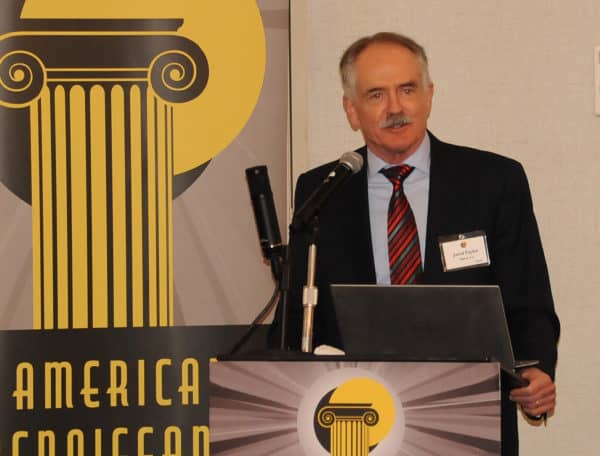
“What is it about whites,” Mr. Taylor wanted to know, “that makes them casually say such vicious things about their own people?” He traced this to a uniquely white compulsion to feel virtuous. Since the mid-20th century, virtue for whites requires that they care deeply for the “oppressed.” Since whites alone have oppressed other races, it is an expression of high virtue to condemn whites and even justify their extermination.
Mr. Taylor noted that this zeal for the welfare of other races and a thirst to condemn their own people is unique to whites. No other peoples ever work up a fanatic conviction that they are bad and should be suppressed.
Mr. Taylor argued that if whites are ever to be free in their own homelands, many more people will have to agree with us. They will have to be pried away from this suicidal form of virtue and made to understand that the supreme virtue for us to ensure our own survival. He urged the audience not to think of our opponents as vicious or bad-intentioned, but as lost brothers and sisters whom we must respect enough to try to understand and win over. We cannot afford the dizzying luxury of hatred; we must enlighten and lead.
Sam Dickson concluded the conference, as he always does. He said that aspects of our national history are difficult problems for whites. He said the American Revolution may have been a mistake, as it divided the British and American people. He also argued American culture favors too much materialism, opposes the frank and necessary use of state power, and often gives Americans the “easy way out,” of just moving away. Mr. Dickson argued that Americans are the descendants of men and women who uprooted themselves in the name of personal fortune-seeking rather than staying loyal to places their families had lived for centuries. This makes our people dangerously individualist and leaves them with only shallow roots and traditions.
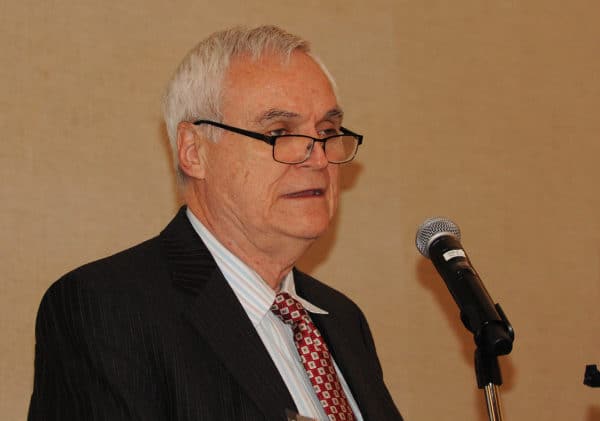
Mr. Dickson argues that this easy-way-out mentality means that Americans have always avoided hard choices. Southern slaveholders were never willing to free the slaves and send them back to Africa to build a nation of their own, even though compensated emancipation and colonization would have cost the nation a fraction of the cost of the Civil War. We must delay hard choices no longer. We need a home of our own. Mr. Dickson said that if whites don’t meet this historical challenge to secure self-determination, our children will pay ever higher costs. There remains only one question: How high a price will we have to pay?
The conference ended on a high note of enthusiasm, with many attendees telling us how much they appreciated what they called an inspiring event.
As many headed for home, we learned something about the gaggle of perhaps 20 antifa demonstrators, who were kept at a safe distance. Unbeknownst to us, the Proud Boys paid them a visit. So far, we have heard only the antifa side of the story, but they claim the Proud Boys started a shouting and then a shoving match, part of which they caught on video.
Needless to say, we deplore all violence and expressions of hate.















